General
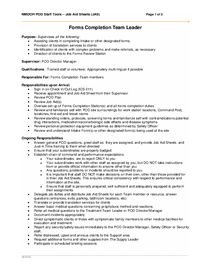 Job Aid Sheets - Forms Completion Team Leader
Strategic National Stockpile - General
October 19, 2016
Job Aid Sheets - Forms Completion Team Leader
Strategic National Stockpile - General
October 19, 2016
Job Aid for POD Forms Completion Team Leader
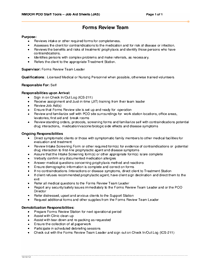 Job Aid Sheets - Forms Review Team
Strategic National Stockpile - General
October 19, 2016
Job Aid Sheets - Forms Review Team
Strategic National Stockpile - General
October 19, 2016
Job Aid for POD Forms Review Team Members
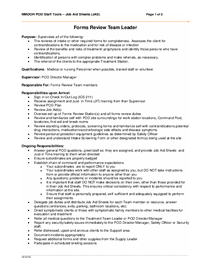 Job Aid Sheets - Forms Review Team Leader
Strategic National Stockpile - General
October 19, 2016
Job Aid Sheets - Forms Review Team Leader
Strategic National Stockpile - General
October 19, 2016
Job Aid for POD Forms Review Team Leader
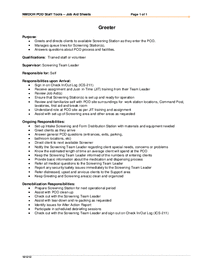 Job Aid Sheets - Greeter
Strategic National Stockpile - General
October 19, 2016
Job Aid Sheets - Greeter
Strategic National Stockpile - General
October 19, 2016
Job Aid for POD Greeters
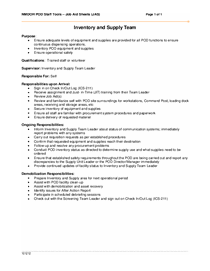 Job Aid Sheets - Inventory and Supply Team
Strategic National Stockpile - General
October 19, 2016
Job Aid Sheets - Inventory and Supply Team
Strategic National Stockpile - General
October 19, 2016
Job Aid for POD Inventory Team Members
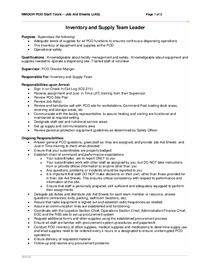 Job Aid Sheets - Inventory and Supply Team Leader
Strategic National Stockpile - General
October 19, 2016
Job Aid Sheets - Inventory and Supply Team Leader
Strategic National Stockpile - General
October 19, 2016
Job Aid for POD Inventory Team Leader
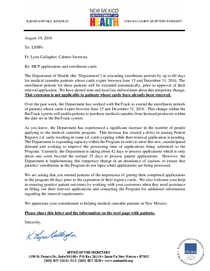 Medical Cannabis Renewal Applications Letter to Licensed Non-Profit Producers
Medical Cannabis Resources, Publications and Archives - General
August 19, 2016
Medical Cannabis Renewal Applications Letter to Licensed Non-Profit Producers
Medical Cannabis Resources, Publications and Archives - General
August 19, 2016
This memo explains the temporary change in enrollment periods for certain persons enrolled in the medical cannabis program to licensed non-profit producers.
 Medical Cannabis Renewal Applications Letter to Law Enforcement Partners
Medical Cannabis Resources, Publications and Archives - General
August 19, 2016
Medical Cannabis Renewal Applications Letter to Law Enforcement Partners
Medical Cannabis Resources, Publications and Archives - General
August 19, 2016
This memo explains the temporary change in enrollment periods for certain persons enrolled in the medical cannabis program to law enforcement partners.
 Medical Cannabis Licensed Non-Profit Producer Re-Licensures List for 2016/2017
Medical Cannabis Licensees (Dispensaries) - General
August 3, 2016
Medical Cannabis Licensed Non-Profit Producer Re-Licensures List for 2016/2017
Medical Cannabis Licensees (Dispensaries) - General
August 3, 2016
This is a list of the licensed non-profit producers for the medical cannabis program that were re-licensed.
 JOE Paramedic Curriculum
EMS Committees - General
April 22, 2016
JOE Paramedic Curriculum
EMS Committees - General
April 22, 2016
This is the course curriculum for paramedics.
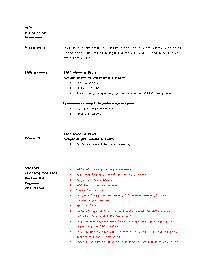 JOE AEMT Instructional Guidelines
EMS Committees - General
April 22, 2016
JOE AEMT Instructional Guidelines
EMS Committees - General
April 22, 2016
This contains the instructional guidelines for advanced emergency medical technician students.
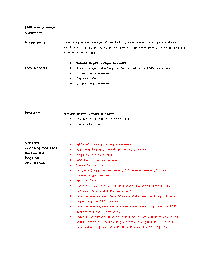 JOE EMR Instructional Guidelines
EMS Committees - General
April 22, 2016
JOE EMR Instructional Guidelines
EMS Committees - General
April 22, 2016
This contains the instructional guidelines for emergency medical systems first responders students.
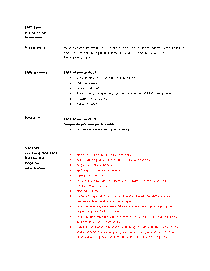 JOE EMT Basic Instructional Guidelines
EMS Committees - General
April 22, 2016
JOE EMT Basic Instructional Guidelines
EMS Committees - General
April 22, 2016
This contains the instructional guidelines for basic emergency medical technician students.
 JOE EMT Instructor/Coordinator Qualifications
EMS Committees - General
March 7, 2016
JOE EMT Instructor/Coordinator Qualifications
EMS Committees - General
March 7, 2016
This contains the minimum requirements for emergency medical services instructors/coordinators.
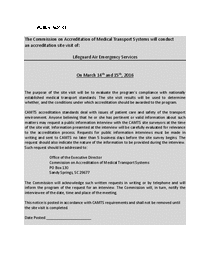 Air Ambulance Site Survey Notice
EMS Air Abulance - General
February 5, 2016
Air Ambulance Site Survey Notice
EMS Air Abulance - General
February 5, 2016
The purpose of the site visit will be to evaluate the program’s compliance with nationally established medical transport standards. The site visit results will be used to determine whether, and the conditions under which accreditation should be awarded to the program.
 JOE EMT Basic Testing Guidelines
EMS Committees - General
September 16, 2015
JOE EMT Basic Testing Guidelines
EMS Committees - General
September 16, 2015
This contains the testing guidelines for basic emergency medical services students.
 JOE EMT Basic Compliance Memo (CNM Summer 2015)
EMS Committees - General
September 11, 2015
JOE EMT Basic Compliance Memo (CNM Summer 2015)
EMS Committees - General
September 11, 2015
This EMT basic compliance memo is from Central New Mexico community college for summer 2015.
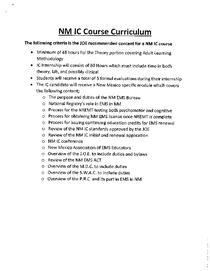 JOE Instructor Coordinator Curriculum
EMS Committees - General
September 6, 2015
JOE Instructor Coordinator Curriculum
EMS Committees - General
September 6, 2015
This is the course curriculum for instructors and coordinators.
 EMS Medical Directors
Emergency Medical Systems - General
July 31, 2015
EMS Medical Directors
Emergency Medical Systems - General
July 31, 2015
This is the most current list of available medical directors throughout the state of New Mexico.
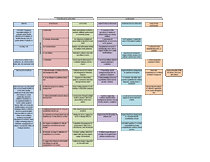 Asthma Control Program Logic Model
Asthma - General
May 11, 2015
Asthma Control Program Logic Model
Asthma - General
May 11, 2015
The Logic Model is a Program Evaluation tool. It helps project partners see how the resources and activities of the NMACP program connect and contribute to desired health outcomes.


